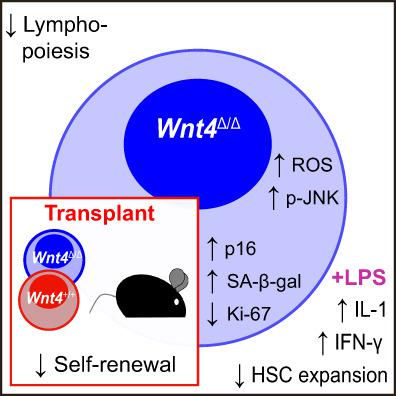当前位置:
X-MOL 学术
›
STEM CELLS
›
论文详情
Our official English website, www.x-mol.net, welcomes your
feedback! (Note: you will need to create a separate account there.)
Cell-intrinsic Wnt4 promotes hematopoietic stem and progenitor cell self-renewal
STEM CELLS ( IF 4.0 ) Pub Date : 2021-04-21 , DOI: 10.1002/stem.3385 Roxann Hétu-Arbour 1 , Mouna Tlili 1 , Fabio Luiz Bandeira Ferreira 1 , Belma Melda Abidin 1 , Edward O Kwarteng 1 , Krista M Heinonen 1
STEM CELLS ( IF 4.0 ) Pub Date : 2021-04-21 , DOI: 10.1002/stem.3385 Roxann Hétu-Arbour 1 , Mouna Tlili 1 , Fabio Luiz Bandeira Ferreira 1 , Belma Melda Abidin 1 , Edward O Kwarteng 1 , Krista M Heinonen 1
Affiliation

|
Although intracellular Wnt signaling pathways need to be tightly regulated to promote hematopoietic stem cell self-renewal, the source and identity of important Wnt ligands in the bone marrow is still largely unknown. The noncanonical ligand Wnt4 is expressed in the bone marrow as well as in the stroma, and its overexpression in fetal liver cells facilitates thymic recovery; however, its impact on adult hematopoietic stem cell function remains unclear. Here, we report that the deletion of Wnt4 from hematopoietic cells in mice (Wnt4Δ/Δ) resulted in decreased lymphopoiesis at steady state. This was likely at least in part due to the increased proinflammatory environment present in the bone marrow of Wnt4Δ/Δ mice. Wnt4Δ/Δ hematopoietic stem cells displayed reduced reconstitution capacity in serial transplants, thus demonstrating defective self-renewal, and they expanded poorly in response to lipopolysaccharide stimulation. This appeared to be the result of the absence of Wnt4 in stem/progenitor cells, as myeloid-restricted Wnt4 deletion had no notable effect. Finally, we observed that Wnt4Δ/Δ stem/progenitor cells were more quiescent, presenting enhanced levels of stress-associated JNK phosphorylation and p16INK4a expression, likely contributing to the reduced expansion observed in transplants. In conclusion, our results identify a new, largely autocrine role for Wnt4 in hematopoietic stem cell self-renewal, suggesting that regulation of Wnt signaling in hematopoiesis may not need Wnt secretion and could be independent of morphogen gradients.
中文翻译:

细胞内在 Wnt4 促进造血干细胞和祖细胞自我更新
尽管需要严格调节细胞内 Wnt 信号通路以促进造血干细胞自我更新,但骨髓中重要 Wnt 配体的来源和身份仍然很大程度上未知。非经典配体Wnt4在骨髓和基质中均有表达,其在胎儿肝细胞中的过表达有助于胸腺恢复;然而,它对成体造血干细胞功能的影响仍不清楚。在这里,我们报告了小鼠造血细胞中Wnt4的缺失 ( Wnt4 Δ/Δ ) 导致稳态淋巴细胞生成减少。这可能至少部分是由于Wnt4 Δ/Δ骨髓中存在的促炎环境增加老鼠。Wnt4 Δ/Δ造血干细胞在连续移植中表现出降低的重建能力,因此表明自我更新有缺陷,并且它们对脂多糖刺激的反应很差。这似乎是干细胞/祖细胞中缺乏 Wnt4 的结果,因为骨髓限制性 Wnt4 缺失没有显着影响。最后,我们观察到Wnt4 Δ/Δ干/祖细胞更加静止,呈现出与应激相关的 JNK 磷酸化和 p16 INK4a水平升高表达,可能导致移植中观察到的扩增减少。总之,我们的研究结果确定了 Wnt4 在造血干细胞自我更新中的一种新的、主要是自分泌的作用,这表明 Wnt 信号在造血过程中的调节可能不需要 Wnt 分泌,并且可能与形态发生素梯度无关。
更新日期:2021-04-21
中文翻译:

细胞内在 Wnt4 促进造血干细胞和祖细胞自我更新
尽管需要严格调节细胞内 Wnt 信号通路以促进造血干细胞自我更新,但骨髓中重要 Wnt 配体的来源和身份仍然很大程度上未知。非经典配体Wnt4在骨髓和基质中均有表达,其在胎儿肝细胞中的过表达有助于胸腺恢复;然而,它对成体造血干细胞功能的影响仍不清楚。在这里,我们报告了小鼠造血细胞中Wnt4的缺失 ( Wnt4 Δ/Δ ) 导致稳态淋巴细胞生成减少。这可能至少部分是由于Wnt4 Δ/Δ骨髓中存在的促炎环境增加老鼠。Wnt4 Δ/Δ造血干细胞在连续移植中表现出降低的重建能力,因此表明自我更新有缺陷,并且它们对脂多糖刺激的反应很差。这似乎是干细胞/祖细胞中缺乏 Wnt4 的结果,因为骨髓限制性 Wnt4 缺失没有显着影响。最后,我们观察到Wnt4 Δ/Δ干/祖细胞更加静止,呈现出与应激相关的 JNK 磷酸化和 p16 INK4a水平升高表达,可能导致移植中观察到的扩增减少。总之,我们的研究结果确定了 Wnt4 在造血干细胞自我更新中的一种新的、主要是自分泌的作用,这表明 Wnt 信号在造血过程中的调节可能不需要 Wnt 分泌,并且可能与形态发生素梯度无关。










































 京公网安备 11010802027423号
京公网安备 11010802027423号